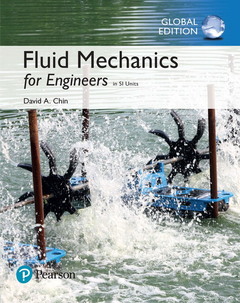Description
Fluid Mechanics for Engineers in SI Units
Author: Chin David
Language: English
Subject for Fluid Mechanics for Engineers in SI Units:
1056 p. · 21x25.8 cm · Paperback
Description
/li>Contents
/li>Comment
/li>
For courses in fluid mechanics.
Introduces engineering students to the principles of fluid mechanics.
Written and conceived by an author with decades of relevant experience in the fields of fluid mechanics, engineering, and related disciplines, this First Edition of Fluid Mechanics for Engineers effectively introduces engineering students to the principles of fluid mechanics. With the understanding that fluid mechanics is a required core course for most engineering students, the author focuses first and foremost on the most essential topics of the field. Practical applications for several engineering disciplines are considered, with a special focus on civil engineering. Elective topics are also included for instructors? consideration with regard to specific courses. Written in a stimulating style, Fluid Mechanics for Engineers fulfills the requirements of a core course while keeping students engaged.
- Properties of Fluids
- Fluid Statics
- Kinematics and Streamline Dynamics
- Finite Control Volume Analysis
- Differential Analysis
- Dimensional Analysis and Similitude
- Flow in Closed Conduits
- Turbomachines
- Flow in Open Channels
- Drag and Lift
- Boundary-Layer Flow
- Compressible Flow
Introduces engineering students to the principles of fluid mechanics in a stimulating and practical style, with a particular focus on the principles that engineering students are most likely to apply in their subsequent undergraduate coursework.
- Material is presented in a thorough and rigorous fashion, featuring practical examples that apply to several engineering disciplines; civil engineering applications are particularly prevalent.
- Quantitative examples and illustrations related to the topics of fluid mechanics are provided throughout.
- Emphasises the fundamentals of fluid mechanics, including fluid properties, fluid statics, basic concepts of fluid flow, and the forms of the governing equations that are useful in solving practical problems.
- The most useful relationships are highlighted to assist in solving practical problems.
- Key equations are listed at the end of each chapter.
- Sequenced with all topics considered essential to core engineering courses in fluid mechanics presented first:
- Properties of fluids (Chapter 1)
- Fluid statics (Chapter 2)
- Kinematics and streamline dynamics (Chapter 3)
- Finite-control-volume analysis (Chapter 4)
- Dimensional analysis and similitude (Chapter 6)
- Flow in closed conduits (Chapter 7)
- Several elective topics also included which may be studied in relevant courses and disciplines:
- Differential analysis (Chapter 5)
- Turbomachines, coverage of which is sometimes considered a mandatory component of a first course in fluid mechanics in civil, environmental, and mechanical engineering curricula (Chapter 8)
- Flow in open channels, an essential coverage area for civil and environmental engineering which may not always be covered in a first course in fluid mechanics (Chapter 9)
- Drag and lift (Chapter 10)
- Boundary layer flow (Chapter 11)
- Compressible flow (Chapt




